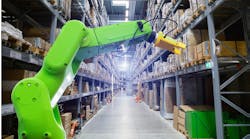A breeding ground for new breakthroughs and innovations, CES 2018 in Las Vegas featured some of the latest technology impacting the business world and our personal lives. This year, blockchain—or, a distributed database where records data is maintained and shared securely across stakeholders—was a key topic of discussion among CES exhibitors and attendees.
“Over the next five to 10 years, blockchain will likely disrupt many industries,” Alex Zaharov-Ruett writes in AI no longer seen as artificial, blockchain boosting business: CES 2018. Calling blockchain “the hottest new technology on the horizon,” he notes that the technology offers promise across a wide range of business applications, including consumer electronics, payment processing and banking, healthcare, online music, content micropayments, and private transport.
Three Emerging Blockchain Applications
By allowing companies to directly exchange assets and engage in contracts without the need for a third party, blockchain is expected to impact the way organizations handle procurement and other activities in 2018 and beyond. Here are three areas where the technology is already gaining momentum:
Logistics and transportation: Calling blockchain technology “the incorruptible distributed ledger that is established with every transaction,” Gigabit’s Connor DiGregorio says this feature has important implications for sourcing departments and puts markets such as bookkeeping, document storage, and inventory accounting services at risk. “Blockchain allows businesses to track assets along the supply chain, introducing increased transparency and cost savings,” he writes in Blockchain: the 2018 disruptor of the year. Walmart, for example, is piloting a blockchain program that tracks produce from farm to shelf. And, IBM and Maersk are testing a similar program using blockchain to track and streamline shipping of a myriad of other products, which resulted in lower costs and fewer delays for the companies’ global trade activities.
Government: In Will 2018 be the year for blockchain for government? FCW’s Derek B. Johnson highlights several different ways Uncle Sam is jumping on the blockchain bandwagon with the hopes of creating more secure, streamlined supply chains. The Department of Defense currently is working to create a new digital supply chain powered by 3D manufacturing, and “envisions a system where individual parts and products are digitally shared, and believes that blockchain ledgers will help protect this new solution from cyberattacks,” Johnson writes. In addition, the Center for Disease Control is working on proofs of concept to use blockchain to better manage and automate the interplay between its fragmented and labor-intensive data systems, FCW reports, and the Office of Personnel Management recently put out a Request for Information for a new Federal Employee Digital Record System to house all federal employee data that includes a preference for solutions that leverage blockchain technology.
Data analytics and processing: “I expect 2018 will be the year that we start to see the convergence of these technologies to truly create the decentralized computing and communications platforms of the future,” Future\Perfect Ventures’ Jalak Jobanputra writes in CoinDesk’s 2018: The Year Blockchain, AI and IoT Converge. This trend will be driven in part by the development of semiconductors that are capable of advanced computing in smaller and smaller devices, he writes. “As devices at the edge become smarter, the smart contracts enabled by blockchain platforms will work better with more advanced data analytics capabilities.”
While blockchain technology and its effect on different sectors are still in their infancies, DiGregorio feels that the blockchain industry is growing exponentially. “While many decades-old companies race to implement the technology in their own operations, blockchain start-ups in every industry are also working to dislodge them,” he concludes. “Without a doubt, the landscape of many markets will change over the next few years, including healthcare, advertising, and even social media.”










